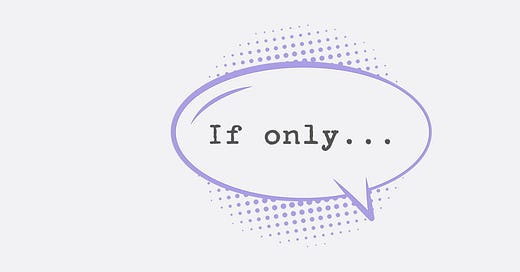If only I had moved to Boston...
If only I had taken that job...
If only I had stayed...
If only I had left...
If only I had married him...
These are all regrets I have heard before. Not surprisingly, regret comes up a lot in therapy. People yearn for those missed moments, squandered opportunities, and roads not taken.
In the short term, we tend to regret our actions more than inactions but in the long run, inaction is what haunts us. The phone call we didn't make, the letter we didn't send, the apology we didn't make, the trip we didn't take, the wedding we were too busy to attend. Regret is a complex emotional experience, often filled with shame, anger, guilt, disappointment, hopelessness, and of course a longing for a different outcome. As Kurt Vonnegut said, "Of all the words of mice and men, the saddest are, 'It might have been.'"
Some regrets are straightforward. Yes, you should have bought Apple stock thirty years ago but many regrets are fueled by our imagination. Endlessly fantasizing about how great life would be if you had made a different choice can turn into a particularly painful form of rumination.
"If only I had married my ex-girlfriend, I would be happy all the time. We would never fight. She would be deeply committed to me. We would laugh all the time and never argue."
Dreaming about what could have been manifests in more mundane matters too. "If only I had ordered the steak instead of the salmon..."
Idealizing the alternative can cause a great deal of needless anguish and unhappiness. Unrealistic daydreams about what could have been ensnare us in a nostalgia for an impossibly perfect world. Instead of looking forward, these longings keep us stuck in the past and locked into a wistful grass-is-greener-on-the-other-side mindset.
Here are 3 ways to put regret into perspective:
1. Remove the rose-tinted glasses
Odds are you are overestimating how great the alternative choice would have been. Instead of dwelling on the fantasy of perfection, consider the alternative through a more realistic lens. It is likely that life wouldn't be all rainbows and unicorns if you had married your ex, ordered the steak, or mastered Mandarin during the pandemic. An awareness of how problematic or lackluster the alternative could have been will help keep needless regret at bay.
2. How can I make what I have better?
Instead of dwelling on the past, focus on what you can do to give yourself a boost in the here and now. An action-orientation will restore agency and combat hopelessness. As an old friend used to say, the grass isn't greener on the other side, the grass is greener where you water it.
3. Emphasize what's good
What choices have you made that you are proud of? What has turned out well? What are you thankful for? Re-orienting yourself to the positives in your life is the antidote for regret. According to Chris Conley, the author of Emotional Equations, there is a formula for happiness:
Happiness = What you have ÷ What you want
When you are grateful for what you have and less fixated on what you long for, regret drifts away.
Of course, not all regret is bad. Regret can help us learn from experiences and anticipatory regret — imagining the regret we might feel in the future — can help us make better choices. The key is not to allow unrealistic fantasies of perfection and infinite happiness keep you stuck in the past.






